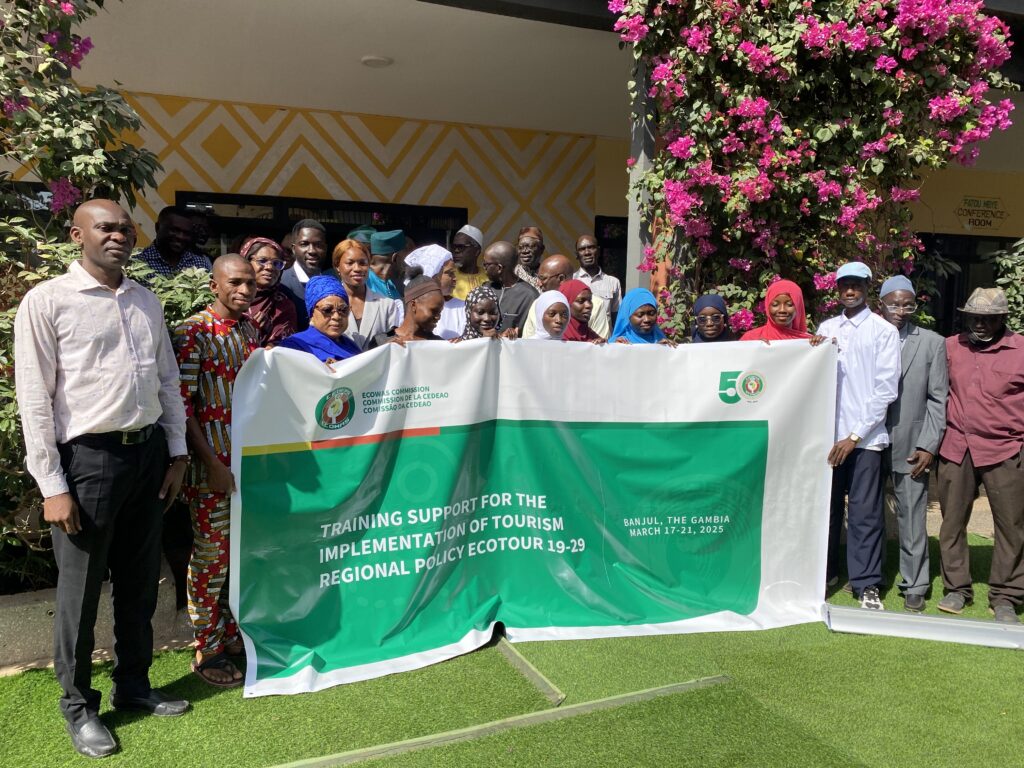
Group Photo Of The ECOWAS Commission Officials And Participants
By Ramatoulie Jawo
The Economic Community of West African States (ECOWAS) Commission on Monday commenced a five-day intensive training on the ECOTOUR 19-29 Regional Tourism Policy at a local hotel in Kotu. The program aims to build the capacity of tourism officials and regulators, equipping them with the necessary knowledge to promote intra-regional tourism and enhance economic integration within ECOWAS member states.
The training brings together tourism officials, private sector stakeholders, immigration experts, development partners, and representatives of tourism regulatory bodies from within and outside Banjul. Participants will gain a comprehensive understanding of tourism policies, standards, practices, and instruments that shape the sector across the region.
ECOWAS officials emphasized the significant role of tourism as a catalyst for sustainable development, economic growth, and regional integration. They highlighted its contributions to job creation, cultural exchange, and the preservation of natural and cultural heritage across member states.
Dr. Tony Luka Elumelu, Director of Private Sector at ECOWAS, underscored the critical role of tourism in the regional integration agenda.”The Gambia plays a critical role, when it comes to tourism. You cannot talk about tourism in Africa without mentioning the Gambia. We also note that ECOWAS on its own has adopted legal instruments to enhance your activities and when you talk about tourism it goes beyond the state and regional level,” she said.
He added that for the successful implementation of the plan, it is crucial for stakeholders to understand the entire process. To achieve this, training sessions are organized, providing an opportunity for idea exchange and ensuring everyone is clear about their roles and responsibilities.
The facilitators emphasized that private sector stakeholders, including hospitality providers, tour operators, transport companies, and other tourism-related businesses, play a vital role in enhancing the development, innovation, and competitiveness of the tourism industry.
They also stressed that for tourism to thrive, collaboration is necessary among private sector actors, governments, and civil society.
Sheikh Tijan Nyang, a tourism consultant, highlighted their long-standing work with the ECOWAS team to build capacity in hotel classification. He mentioned that they have developed a policy that many member countries are unfamiliar with. Over the years, they have traveled extensively throughout the region to foster understanding among the member states.
He expressed pride in being a Gambian and leading the classification system, noting that he is also the chair of the THC, a project aimed at establishing standards in this field.
Additionally, he pointed out that this program is designed to ensure that member countries are well-versed in the ECOWAS tourism policy.
He urged participants to approach the workplace with an open mind, as without openness, they may not fully benefit from the experience.
Ellen T. Johnson, one of the participants, shared her expectations for the workshop, emphasizing the need for stronger regional trade ties.
“It Is high time Gambia we do inter-trading with other West African countries, because the trend in which the world is going before tapping in to the international world, I think the ECOWAS regions can do a lot within ourselves,” she said.
She said cross border trading has been hitting them so much that they cannot do much within the African countries.
She emphasized that by the end of the five-day program, she hopes to see a recognition of the need to create opportunities for business traders to operate freely and flexibly across West Africa, enabling inter-trading. She described this as crucial for women in today’s global economy.
The five-day workshop will feature presentations, training sessions, and group discussions. Expected outcomes include improved compliance with ECOWAS tourism regulations, enhanced cooperation among member states, strengthened strategic partnerships, and recommendations for policy reforms and implementation strategies.

